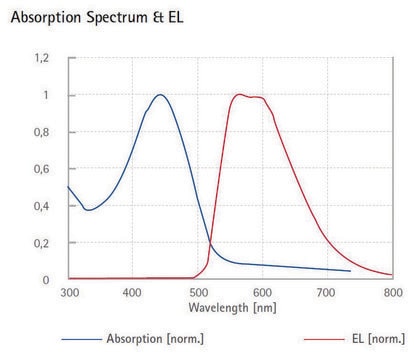571032
Poly[9,9-bis-(2-ethylhexyl)-9H-fluorene-2,7-diyl]
light-emitting λem 409 nm (in chloroform)
Synonym(s):
Poly[9,9-di-(2′-ethylhexyl)fluorenyl-2,7-diyl]
About This Item
Recommended Products
transition temp
Tg (DSC) 45 °C (onset)
solubility
THF: soluble
chloroform: soluble
toluene: soluble
xylene: soluble
λmax
374 nm
fluorescence
λex 362 nm; λem 409 nm in chloroform
General description
Application
Storage Class Code
11 - Combustible Solids
WGK
WGK 3
Flash Point(F)
Not applicable
Flash Point(C)
Not applicable
Personal Protective Equipment
Certificates of Analysis (COA)
Search for Certificates of Analysis (COA) by entering the products Lot/Batch Number. Lot and Batch Numbers can be found on a product’s label following the words ‘Lot’ or ‘Batch’.
Already Own This Product?
Find documentation for the products that you have recently purchased in the Document Library.
Articles
LEPs enable a wide range of important applications including sensors, flexible LED displays and lighting devices, optical pump lasers, and potentially polymer diode lasers.
LEPs enable a wide range of important applications including sensors, flexible LED displays and lighting devices, optical pump lasers, and potentially polymer diode lasers.
LEPs enable a wide range of important applications including sensors, flexible LED displays and lighting devices, optical pump lasers, and potentially polymer diode lasers.
LEPs enable a wide range of important applications including sensors, flexible LED displays and lighting devices, optical pump lasers, and potentially polymer diode lasers.
Our team of scientists has experience in all areas of research including Life Science, Material Science, Chemical Synthesis, Chromatography, Analytical and many others.
Contact Technical Service
![Poly[2-methoxy-5-(2-ethylhexyloxy)-1,4-phenylenevinylene] average Mn 40,000-70,000](/deepweb/assets/sigmaaldrich/product/structures/344/488/b8f8179d-3970-4deb-a754-adda88cdb36f/640/b8f8179d-3970-4deb-a754-adda88cdb36f.png)






